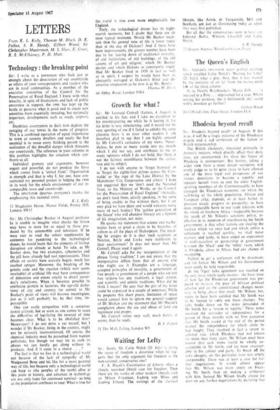Sir: Mr Christopher Booker (4 August) professes he is unable
to imagine what shocks the future may have in store for us equal to those pro- duced by the automobile and television. If he were ever to read the colour supplements he contemns for pandering to the technological dream, he would learn that the elements of further disruption are already at hand. To take, as Mr Booker does, but two examples, cybernetics and the pill have already had vast repercussions. Their effects on society have scarcely begun, much less reached apogee. Moreover, the breaking of the genetic code and the creation (which now seems inevitable) of artificial life may have consequences of dimension and extent utterly to dwarf yester- day's cataclysms. When it becomes possible to synthesise protein in factories, the age-old dicho- tomy of city and country (so central to Mr Booker's point of view) will become meaningless, just as it will probably be, by that time, im- perceptible.
One can easily sympathise with a conserva- tionist attitude, but as soon as one comes to cases the difficulties of legislating the reversal of time becomes clear. What is to be abolished first? Motor-cars? I do not drive a car myself, but I wonder if Mr Booker, living in the country, might not be seriously inconvenienced. Of course, the chemical industry must be prevented from wanton pollutions, but though we may try to curb its abuses we can hardly get along without its products. And if it came to a choice . . . ?
The fact is that we live in a technological world not because of the lack of sympathy of Mr Wedgwood Benn and his like for a more pastoral way of life, but because only a technological world can keep us (the peoples of the earth) alive at this point in history, and advances in technology are our, only hope for continued survival—as long as the population continues to soar. What is true for
the world is true even more emphatically for England.
Truly, the technological dream has its night- marish moments, but I doubt that these are its most typical moments. Would Mr Booker main- tain thaw the general tone of life is lower today than in the day of Dickens? And if there have been improvements, the greater number have been due to the 'tearing down of traditional morality. of old institutions, of old buildings, of the old canons of art and religion,' which Mr Booker decries and which Dickens so consistently urged. Had Mr Booker lived in 1850 in fact as well as in spirit, I suspect he would have been as pleasantly outraged at Dickens's blind and de- structive utopianism as he now is at Mr. Berm's.






























 Previous page
Previous page